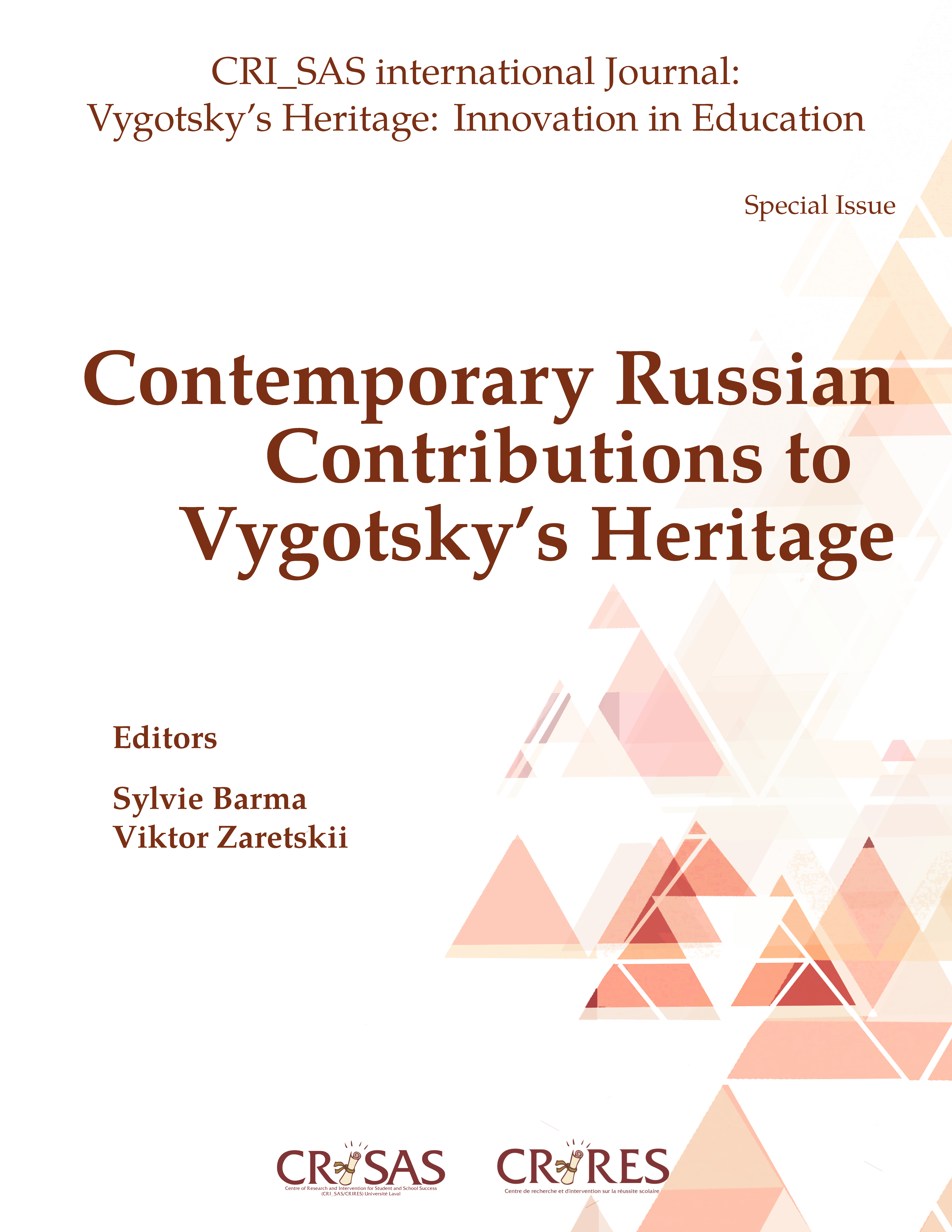Multidimensional Model of the ZPD as Tool of Analysis of the Child’s Cognitive-Personal Dynamics of Development While Overcoming Learning Difficulties
DOI :
https://doi.org/10.51657/ric.v4i1.40999Mots-clés :
L. S. Vygotsky, ZPD, Collaboration between teacher and student, ToolsRésumé
The main idea of the paper is based on L. S. Vygotsky’s concepts of ZPD and collaboration of teacher and student. The special process between teacher and student, organised in child’s zone of proximal development with using reflection and reflective questions as mail helping tools, leads to qualitative changes firstly in cognitive development of the student. Successes in learning activity create base for development of personal features. Thus, in such process, we may see strong connections between cognitive and personal developmental trajectories. Understanding of these connections gives an opportunity of mediative work with personal diÿculties of a child, opportunity to turn simple processes of learning into counseling work, e˙ecting all spheres of development.
Références
Kholmogorova, A. B.,&Zaretskii, V. K. (2011). Mozhet li kul’turno-istoricheskaya kontseptsiya L. S. Vygotskogo pomoch’ nam luchshe ponyat’, chto my delaem kak psikhoterapevty [Can the cultural-historical psychology of Vygotsky help us better understand whatwe are doing as psychotherapists]. Kul’turno-istoricheskaya psikhologiya [Culturalhistorical psychology](1), 108–118.
Vygotsky, L. S. (1984). Problemy detskoi (vozrastnoi psikhologii) [Problems of childhood (developmental) psychology]. In Collected works in 6 volumes. Vol. 4. (p. 243-432). Moscow: Pedagogika.
Zaretskii, V. K. (2007). O chem ne uspel napisat’ L. S.Vygotskii [What Vygotsky didn’t have time to write]. Kul’turno-istoricheskaya psikhologiya [Cultural-historical psychology](3), 96–104.
Zaretskii, V. K. (2009). Zone of proximal development: What Vygotsky didn’t have time to write. Journal of Russian and East European Psychology, 47(6), 70–93.
Zaretskii, V. K. (2013). Stanovlenie i sushchnost’ refleksivno deyatel’nostnogo podkhoda v okazanii konsul’tativnoi psikhologopedagogicheskoi pomoshchi [Development and nature of Reflection and Activity Approach to the provision of advisory psychological and educational assistance]. Konsul’tativnaya psikhologiya i psikhoterapiya [Counseling psychology and psychotherapy](2), 8–37.
Zaretskii, V. K. (2016). Odin shag v obuchenii – sto shagov v razvitii: Ot idei k praktike [Vygotsky’s Principle "One step in learning - One hundred steps in development": From idea to practice]. Kul’turno-istoricheskaya psikhologiya [Cultural-Historical Psychology], 12(3), 149–188.
Zaretskii, V. K., & Gordon, M. M. (2011). O vozmozhnosti individualizatsii obrazovatel’nogo protsessa na osnove refleksivno-deyatel’nostnogo podkhoda v inklyuzivnoi praktike [Possibility of individualization of the educational process on the basis of reflection and activity approach in the inclusive practice]. Psikhologicheskaya nauka i obrazovanie [Psychology science and education](3), 19–26.
Téléchargements
Publié
Numéro
Rubrique
Licence
© Irina Nikolaevskaya 2017

Cette œuvre est sous licence Creative Commons Attribution - Pas d'Utilisation Commerciale - Pas de Modification 4.0 International.

